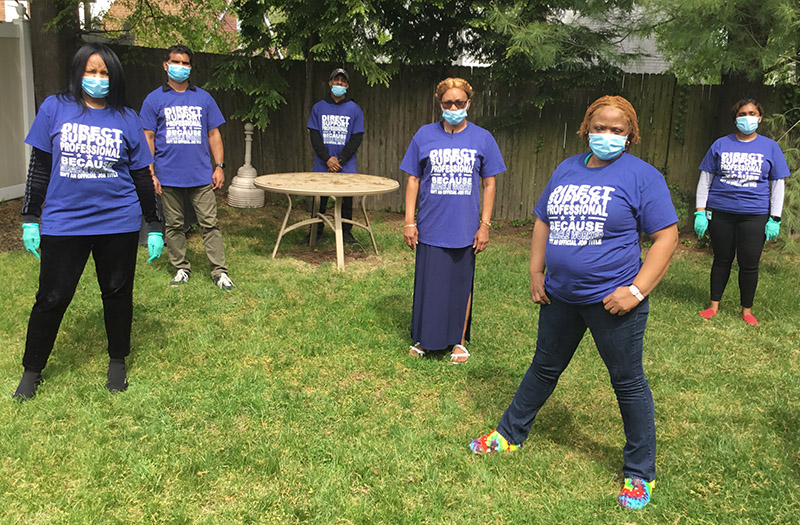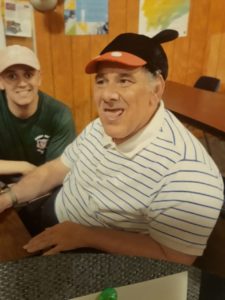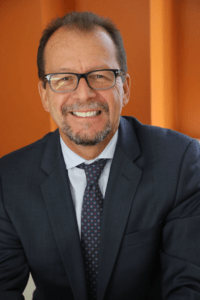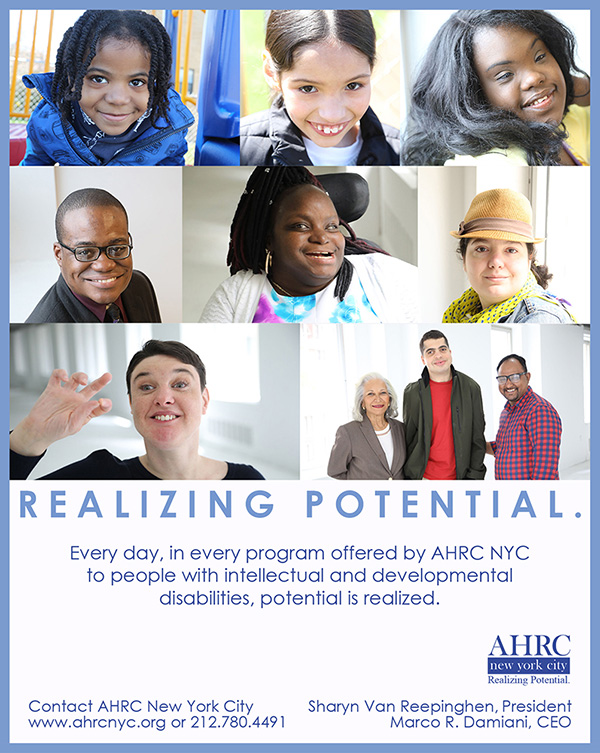Months into our response to the COVID-19 epidemic, we have suffered heartbreaking losses and struggled through many challenges. Through it all, our staff’s extraordinary devotion, caring and tireless efforts to support people with disabilities, their families, and each other, has been unprecedented.

Some of AHRC New York City’s essential staff at its Fresh Meadow Lane residence in Queens, NY
No one can predict when the Coronavirus crisis will truly settle down and end. But we can find comfort knowing that we are truly all in this together and, because of that, our bonds will be strengthened as we learn together, plan together and rebuild together.
Staff, who are considered essential workers not only in New York State but across the country, have demonstrated this every day. They are heroes. In many ways, this crisis has brought out the best in our staff at all levels. We can never give enough praise and express sufficient gratitude to our front-line staff. I’d like to share just a few of the many inspiring stories about our front-line staff.
Our First Loss

Robert Caruso, who passed away in March
from Covid-19, lived at AHRC NYC’s
Pembrook residence for nearly 20 years
When Robert Caruso, one of the original residents of an AHRC New York City group home for people with intellectual and developmental disabilities (I/DD) in Howard Beach passed from COVID-19, the impact on his peers and staff was devastating.
Kisha Kennedy-Vanholt, Manager of the home, knew it was up to her team to help everyone recover.
When she told Caruso’s roommate, he cried. “I couldn’t hug him; that was heartbreaking,” Kennedy-Vanholt said.
But this is life under social distancing. Caruso was the first person we supported at AHRC NYC to die from the virus. Unfortunately, with people living in group residences, he wouldn’t be the last.
Suffering Broken Hearts
After Caruso’s passing, the others in the home stayed in their rooms and stopped eating. They were exposed to COVID-19 and were frightened, but they also likely were suffering broken hearts. “We knew we had to fight really hard to bring life back to the program,” Kennedy-Vanholt said.
The word from their primary care physicians was: Don’t go near the emergency room or urgent care. Staff tried making favorite foods and finally the individuals began to eat.
“The life is here again,” Kennedy-Vanholt said. “You can feel it when you walk in the door.”
Adult Day Services Come to Homes
Staff members showed their courage and heart by keeping adult programs open. They knew that providing exercise, art and drama were more important now than ever.
Phurbu Dorgee, a Records Coordinator at one of our Adult Day Services programs, has been working with Joseph Bell since April 14. They exercise and paint, something Joseph particularly enjoys. “You have to work; you have to take a risk,” Dorgee said. “The most important thing is that I’m here for Joseph.”
“Painting makes me feel happy,” Bell says. “I work hard on my paintings to be an artist.”
Melanie Freeman, from our Manhattan Day Hab Without Walls, has been lending a hand at our 95th Street residence in Manhattan. “I try to find things to keep everyone entertained with a focus on mindfulness,” she said, adding that she runs a drama therapy group to help individuals express themselves. The group has made sensory bottles, do karaoke, dance and much more.
Telehealth Breaks Through as an Essential Service and Support
The Coronavirus has changed the way we, as service providers, do everything. It has taken us out of our comfort zone. Pushed by COVID-19, technology has become the backbone of many of our services.

Marco Damiani, CEO
AHRC New York City
As the virus began spreading in New York City, AHRC NYC’s partnership in The Cerebral Palsy Association of New York State’s $13 million grant from the Statewide Healthcare Facility Transformation Program couldn’t have come at a better time. The telemedicine equipment connects to StationMD through a wireless tablet mounted on a portable kiosk. The system delivers virtual health care with a goal of reducing trips to the emergency room and hospitalizations.
People with I/DD are more prone to COVID-19 due to underlying medical conditions such as diabetes, asthma, heart disease, stroke and other disorders.
A 75-year-old Queens man with I/DD who lives in an AHRC NYC group residence was ill with a fever and chills. Staff thought it might be Coronavirus. Rather than expose him to urgent care or the emergency room, they used StationMD. The StationMD doctor reviewed the man’s history and observed the man. The doctor prescribed Keflex for a urinary tract infection, and the man was better in three days.
“I’m a believer in helping the person where they’re at, in their own home with people who care about them,” said Marcia Richman, an AHRC NYC Registered Nurse and Residential Health Care Coordinator and Home Care Director of Patient Services.
Supporting Our Staff
In times of crisis, everyone is anxious. We must make sure we “hear” and respond to our staff’s anxieties. So when our clinicians began making virtual mental health visits, through doxy.me with people with disabilities and their families, we were able to use a similar platform to connect with staff facing increased stress during this pandemic.
“Some people need more support than others,” said Dr. Richard Cohen, Director of Clinical Services, referring to individuals with disabilities and their families. “We are always assessing how much may be needed to meet individual needs. We’re looking at what resources are available and what additional support may be helpful.
“Our goal is to keep people safe in their own home and minimize unnecessary exposure to emergency rooms for mental health care. AHRC NYC Clinicians work to address the myriad of stressors associated with this pandemic. The impact of social isolation and disruption of life routines are significant, and supports are essential.”
Distance Learning
Remote learning is new for our preschoolers, school-age and college students, their parents and teachers. No one was quite sure what to expect when our schools were forced closed. We were fortunate to have such dedicated teachers, who weren’t too sure how distance learning would work with their students.
“It’s a very technically advanced way of teaching children,” said John Goodson, Assistant Director of Educational Services and Program Development, adding that the staff has worked diligently to make this work in all the schools. “We’re teaching students and training parents on using different techniques to drive ABA (Applied Behavioral Analysis). We’re coaching parents to be the primary clinicians and now they are.”
Vanecia Murphy is a Behavioral Trainer at AHRC NYC’s Brooklyn Blue Feather Elementary School. “For me, the experience started off rough,” she said. “I had to prepare everything, and I wasn’t sure what to expect of the students and their parents. How were we going to get parents and students on board?”
Now, she loves remote learning because her students, to her surprise, are cooperating. While she conducts a one-on-one session with the student and the parent, by his/her side, she will deliver verbal praise, as will the parent, by sitting nicely and complying. Parents are encouraged to have stickers or edible reinforcers nearby.
To break up her routine, Murphy took her students on a virtual field trip to the aquarium. It was such a success that she shared the idea with her colleagues.
As with our telehealth program, our timing to partner with STAR Autism Support, which provides curriculum, was opportune. The company began remote learning for children with autism when COVID-19 developed in China. Goodson visited a Long Island preschool in 2016 and decided to pilot it in three preschools.
Pride and Thanks Do Help, But Funding is Needed
I could not be more proud of our staff and the people they support. They have gone above and beyond in every possible way.
Like other providers across the country, AHRC NYC has incurred large and urgently needed additional expenses in staffing costs. We’ve also had to purchase huge amounts of Personal Protective Equipment (PPE) to keep our staff and the individuals they support safe.
The House has recently passed another COVID-19 relief bill, which included dedicated funds for Medicaid home and community-based services, PPE and our workforce. Congress must include people with disabilities, their families, and direct support professionals in the next COVID-19 relief bill.
Medicaid-funded disability providers have not received any emergency relief funds from the federal government. If you haven’t already, please write to your members of Congress and tell them that Medicaid service providers who support people with I/DD need funding now.
Thank you to all the parents, direct support professionals and other caregivers supporting people with disabilities. You are providing care under unprecedented conditions and are the key safety net for individuals with disabilities. Indeed, you are essential.
Marco Damiani is CEO of AHRC New York City. He has 40 years’ experience in the field. Marco was recently appointed to the Mayor Bill de Blasio’s Sector Advisory Council on Public Health and Healthcare.







[…] Original Article […]